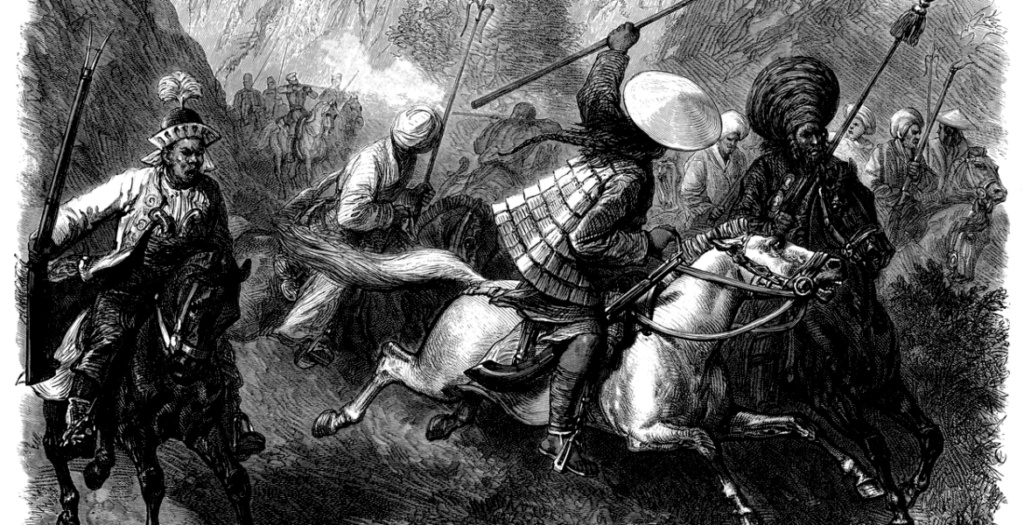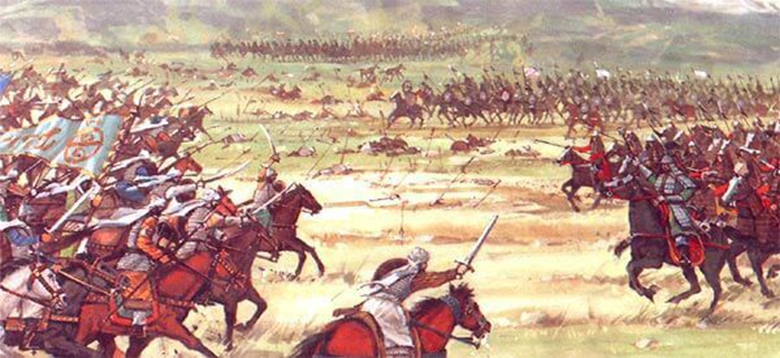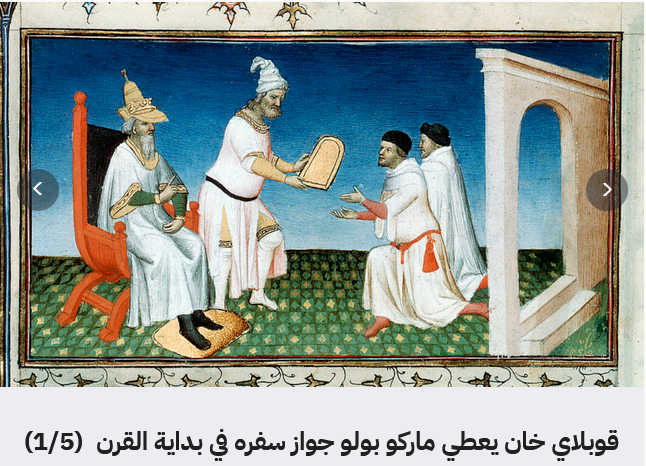?After the Mongols invaded Baghdad and killed the Caliph Al-Mustasim, how did the descendants of Genghis Khan become Muslims

The Mughal Empire was a formidable, but relatively short-lived, empire that stretched at its height from the Pacific Ocean to Central Europe. However, despite its expansion, it was only united for a few decades. It was the largest empire in history in terms of contiguous territories before it was splintered into small empires in the sixties of the thirteenth century, by civil war.
The Mongol Empire arose in the eastern steppes in 1206. Originally, the Mongols were pastoral tribes of nomads with their origins in the far north of China. They were pagans, worshiped the sun and others. The term "Tatars" is often used to describe the Mongol, Turk, Uyghur and Seljuk tribes living in and around northern China.
Because they are nomads who herd large herds of animals in Mongolia, they are known for their skill as knights, writes Marie Favreau, assistant professor in the history department at Paris Nanterre University, in her book The Tribe: How the Mongols Changed the World .
Horses allowed them to travel great distances and control a large area of land. The Mongols also excelled in the use of the compound bow - a powerful weapon that horse riders can use on horseback - and this gave them a strong advantage in battles, writes Timothy May, professor of Central Eurasia at the University of North Georgia, in his book "The Mughal Empire: A Historical Encyclopedia . "
The brutal Mongol armies terrified the whole world when they began their bloody journey in the thirteenth century, from East Asia in China to the Abbasid Caliphate. But the tragedy was completed in Muslim countries when these armies invaded - at the hands of their leader Hulagu - the Abbasid capital, Baghdad, and killed the Caliph Al-Mustasim Billah in the year 1258.
However, how did the Mughal state become a Muslim state, after it almost caused the complete annihilation of the Islamic state? How did those invaders who came from the east, to overthrow the Muslim civilization, convert to the religion of Islam?

Genghis Khan, the first founder of the Mongol Empire
Genghis Khan was born around 1160 with his original name Temujin, and his father, Yosgi, controlled a group of 40,000 families. Yosgi was poisoned when Temujin was a child, and was abandoned by some families who were loyal to his father.
Temujin's family held out, and he himself eventually became the leader of the group. He formed alliances and gradually built up his power, while occasionally fighting certain groups. By 1206, Temujin had conquered most of Mongolia, and had taken the title of Genghis Khan, which is sometimes translated as "universal ruler".
The subsequent invasions of Genghis Khan swept the world, establishing the Mongol Empire. In 1215 he captured Chongdu (near modern Beijing), the capital of the Chinese Jin dynasty. In 1219, he launched a military campaign against Khiva (located in modern-day Iran), and conquered most of the territory of the Khwarezm state .
During the rise of Khan, there was an Islamic state expanding in the Asian continent is the Khwarizm state, which was led by Ala al-Din Muhammad al-Khwarizmi, nicknamed Muhammad Shah Khwarizmi .
In 1206, the same year that Khan took control of all of Mongolia, Muhammad Shah was able to control Afghanistan, then in 1207 he took control of Samarkand, after which he challenged Genghis Khan.
Khan had sent messengers to Shah Khwarazm with the aim of establishing trade relations, but the latter killed them after one of his princes thought they were spies; Genghis Khan begins his conquest of the Khwarazmian state , which effectively ended in 1231.
It is worth noting that the Mongols had no previous experience in siege wars, before the campaigns of Genghis Khan, who also urged the implementation of reforms in the management of the Mongol Empire.
He had writers from the Uyghurs, who lived in central Asia that was conquered by the Mongols, and these writers established a writing system for the Mongol language based on the Uyghur script. He also introduced administrative changes to his growing empire.
The most important aspect of his government was the "Golden Tribe", consisting of Genghis Khan and his descendants. According to Mughal law, only the sons of his Golden Tribe could become the leaders of the Mughals.
Genghis Khan died in 1227 after making his empire four times larger than the Roman Empire, which he divided before his death among his four sons: Joji Khan, Chagatai Khan, Oktay Khan, and Toli Khan.
Oktay Khan, the third son of Genghis Khan, became the Great Khan - that is, the leader of the Mongols - while Khan assumed the rule of Khurasan with the future hope of expanding into Iraq and Diyarbakir. He actually managed to extend his control over all the Persian emirates, and reached the borders of Iraq, but he died in 1229, and was succeeded by his son Hulagu .
As for Joji Khan, the eldest son of Genghis Khan, he ruled the Caucasus and parts of Russia. Later, his son Baraka Khan, the leader of the Golden Horde, introduced Islam to the Mughals and the Mughal Empire.
When talking about the symbols of the Mongols, Genghis Khan and his grandson Hulagu are often mentioned, without mentioning one of the greatest leaders of the Mongols: the grandson Baraka Khan.

Baraka Khan, the Muslim Mughal who stood against Hulagu
Baraka Khan converted to Islam in 1252, and the credit for his conversion to Islam - according to some accounts - goes to the Sufi Sheikh Saif al-Din al-Bakherzi, who converted to Islam at his hands in Bukhara. After that, Baraka Khan returned to his country and began calling for Islam. Tents are carried with them wherever they go.
After assuming the presidency of the Golden Horde, succeeding his brother Batu Khan, he began to display the rituals of Islam, and completed the construction of the city of Saray (the place of the city of Saratov is now located in Russia) and made it the capital of the Golden Horde, as well as building and expanding mosques there, until it became the largest city in the world at the time, and made it on the Pure Islamic Azimuth.
The Islam of Baraka Khan and his assumption of power came at a time when the Mongols “others” were the terrifying nightmare of the Muslims, when his cousin Hulagu was attacking Muslim countries, and he was able to enter Baghdad in 1258; Only two years before the Mongols received the historic defeat of the Qutuz army in the famous Battle of Ain Jalut .
Some references indicate that, when Hulagu persuaded his older brother Mongku Khan to attack Baghdad and the rest of the Muslim lands, Barakeh Khan turned to his brother Batu (who helped Mongku reach power, after the death of Giok Khan, a grandson of Genghis Khan). Indeed, Batu was convinced and persuaded Monco to stop the war. Hulagu waited until Batu's death, and then launched his war again.
Why did Baraka Khan turn to his brother Batu? The two men are said to have been greatly influenced by their stepmother, Joji Khan, Princess Risala bint Sultan Alaeddin Khwarizm Shah. They were always defending Muslims.
Hulagu's actions were controversial, even to the Mongols themselves. Marie Favreau wrote that Baraka Khan condemned the decision to execute Caliph Al-Mu'tasim. Records say that "in 1259, Baraka wrote a letter to Mongko Khan, pledging to hold Hulagu accountable for shedding so much innocent blood." But Monko Khan died before the letter could reach him.
After Ain Jalut and Al-Zahir Baybars assumed power in Egypt and the Levant, a rapprochement occurred between him and Baraka Khan, who began to convince more Mongol soldiers to convert to Islam, until Baraka entered into an alliance with Baibars amid endless correspondence, and began to raise problems and strife between the leaders and leaders of the Mongols.

A civil war between the Mongols in the struggle for the sole ruler
When Mongko Khan died in August 1259, there was no consensus on his successor, and a civil war broke out that tore the Mughal Empire forever. Mongko Khan's two brothers, Eric Bok and Kublai, claimed the mantle of the Great Khan, and each organized their own coronation council.
According to Live Science , the Mughal leaders of all stripes took a different side and went to war against each other.
In 1263, Erich Bock was forced to surrender. It is true that Kublai Khan was the one who ruled in the end, but he did not extract the recognition that he is the greatest of all the leaders of the Mongols, and he was not able to extend his authority over the entire Mongol Empire, but he expanded to China!
The Mughal Empire became divided into a number of small empires that ruled large swathes of land around Asia and Europe.

Hulagu founded the Ilkhanid state and his sons converted to Islam
One of the states that spread in the wake of the Mongol civil war was the Ilkhanate, which in 1263 ruled over an area stretching from Iran to parts of modern-day Turkey.
Its rulers converted to Islam in 1295, and it survived until the middle of the fourteenth century, before its last monuments were destroyed in 1357.
The Ilkhanate state was famous for its architectural achievements. The most famous example of these accomplishments was the mausoleum built for Mehmed Olgaitu (also known as the "Dome of Soltaniyeh"), one of the rulers of the Ilkhanid state, in Soltaniyeh, Iran.
In the Ilkhanid state, the seventh son of Hulagu, Ahmed Tekodar , became famous, who converted to Islam and declared reconciliation with the Muslim state in Egypt and the Levant (the Mamluks) before the Mongols killed him.
As soon as his brother Abaqa Khan died, the struggle for the throne began after him, and it was going on between those who supported Arghun bin Abaqa as the ruler, and those who considered that the law of Genghis Khan makes the head of the family the ruler. With this, Ahmed Tekodar is supposed to become the Ilkhan (a term for the ruler).
The Mongol princes met and chose Ahmed Tekodar, following the law of Genghis Khan, and his access to power was promising for Muslims, whether for those who were under the rule of the Mongols in Iran and Iraq, or for Muslims in the Mamluk state in Egypt and the Levant.
Unlike other Mughal princes who professed Islam for political gain, Tokodar took steps to solidify his relationship with the Muslim world and Muslim leaders. He sent a letter to Sultan Al-Mansur Qalawun informing him of this, and he also sent a letter to the scholars of Baghdad declaring himself "the protector of the Islamic religion", and he ordered the construction of mosques and the establishment of Sharia.
In an attempt to expand the circle of Islam, he tried to spread it among the Mughal princes and sects. He was not very successful, but he was able to convince some of them with his gifts, grants and titles.
The period of the rule of the Ilkhan Ahmed Tekodar, and the idea of a Muslim coming to power in the Mughal kingdom in Persia, was a great progress, and Tekodar opened the way for those after him, and the Mongols later became Muslims.
Even if some of the Ilkhans took advantage of Islam in order to achieve military victories and compete with the Mamluks, Islam spread widely in that country after Ahmed Tekodar.
Tekodar Ilkhana did not last more than two years for the Mongols, and his dreams and good intentions came with the advent of the fanatic Argun - like his father Abaqa and grandfather Hulagu - after he defeated Tekodar with his supporters and removed him from the throne and killed him in the year 1284.
And the successors of Tekodar Ahmed remained on their paganism, until Ghazan - the seventh Ilkhanate - entered the Islamic religion in 1295, and made it the official state religion in Persia. The Muslim scholar Ibn Kathir had mentioned Ghazan's conversion to Islam, and he and other historians explained that the credit for his conversion to Islam is due to the good Turkish prince Tuzun, who converted Ghazan by his efforts.
Ibn Katheer said: “And in it is the king of the Tatars, Ghazan bin Arghun bin Abgha bin Tawali bin Genghis Khan, and he embraced Islam, and he declared Islam at the hands of Prince Tuzon, may God have mercy on him. And the sermon, and he destroyed many churches, and imposed tribute on them, and redressed many grievances in Baghdad and other countries.”

The Great Khan establishes the Mongol dynasty in China
Perhaps the most famous of the small empires of the Mongol Empire was the "Yuan dynasty" led by Kublai Khan . While Hulagu was wreaking havoc in the Islamic East, his older brother Kublai was occupying southwestern China and contemporary Vietnam.
In 1263, this dynasty controlled most of the lands of northern and central China, but southern China was controlled by the "Southern Song Dynasty", and it was ruled by a Chinese emperor who extended his rule to about 50 million Chinese at that time.
By 1273, the perseverance of the Mongols led to the fall of the fortified city of Xiangyang. Gradually, the wealthy realms of the Southern Song dynasty began to collapse completely before Kublai Khan, who continued to advance southward.
In 1279, the entire territory of the Southern Song fell to Kublai Khan, and the emperor was killed. At that time, China was unified for the first time in centuries, under the rule of the Mongol Yuan dynasty, which was headed by Kublai Khan.
Perhaps the most remarkable thing that the Mongols did in China was the construction of the city of Xanadu. This city was used as the summer capital of the rulers of the Yuan dynasty, and was romanticized by popular culture. It included a luxurious area, an imperial city, and an outer city, and it extended over an area of about 484,000 square meters. Archaeological excavations revealed dragons that adorned the palaces.
It is said that the explorer Marco Polo visited Xanadu around the year 1275 and claimed that he served Kublai Khan as an official, and continued to rise in positions until he reached the position of governor of a region. But Marco Polo's visit to Xanadu and his work for Kublai Khan is a source of controversy among contemporary historians.
Ultimately, the Yuan dynasty lived for a short time, before starting a rebellion in 1368, which resulted in the destruction of Xanadu. This rebellion prompted the Mongol rulers to return to Mongolia, allowing a new Chinese dynasty, the Ming dynasty, to gain control of China.

The Golden Horde, which introduced Islam through Barakat Khan
The term "Golden Horde" is used to describe the Mughal Empire, which controlled areas of Europe. In 1263, the Golden Horde gained control of areas of eastern Europe, the Caucasus, and present-day western Russia.
The Golden Horde - which was ruled by Baraka Khan, after the death of his brother Batu, and dedicated during his reign to be an Islamic empire - maintained good relations with European powers, such as the Republic of Genoa in Italy, and sometimes used the Genoese as trade intermediaries.
The Golden Horde also tried to control the lords of the cities it ruled, such as Moscow, using them as intermediaries to collect taxes. At times the princes cooperated with the Golden Horde, while they launched revolts against the Golden Horde, which they had to put down.
In the time period between the middle and late fourteenth century, the Golden Horde faced a number of problems, including the Black Plague , revolutions, and disputes over who should lead the tribe, which witnessed a state of fragmentation.
The late fourteenth century witnessed the attacks of the Golden Horde from the Timurid state, which arose in Iran and Central Asia and was led by a new ruler at the time, Tamerlane.
In 1395, Tamerlane's forces achieved a decisive victory at the Battle of the Terek River in the Caucasus; Resulting in the destruction of the majority of the territory of the Golden Horde. The rest of the Golden Horde disintegrated during the fifteenth century.

The Chagatai Khanate, the longest-lived of the Mughals
The Chagatai Khanate, the longest-lived Mongol Empire in the aftermath of the empire's civil war, ruled a large swath of central Asia.
There is not much information about the entry of Islam in this branch that ruled the central region of the Mughal Empire, but many of the rulers of this state were assisted by a Muslim minister, despite the fact that Chagatai Khan was restricting Muslims with regard to their rituals. Some believe that Chagatai was one of the fiercest enemies of the Muslims among all the Mughal Ikhwans.
But Arghana, the wife of Karahulaku, grandson and successor to Chagatai Khan, raised her son in Islam.
In 1264 he demanded the rule, which was in dispute between the Mughal lords, but was soon deposed by his cousin Buraq Khan . Islam did not spread clearly in this branch of the Mughal Empire, until the fourteenth century, after the conversion of Tarma Shirin Khan, son of Chagatai Khan, in 1326.
The Chagatai Khanate recognized Kublai Khan's authority as the "Great Khan" for a short period, before separating in the late 1360s and eventually waging war against the Yuan dynasty; This is according to what Zanat Kondakbayeva, a professor at Al-Farabi Kazakh National University, wrote in his book “The History of Kazakhstan: From the First Era to the Present Era . ”
The Chagatai Khanate lasted until the end of the seventeenth century. In the 1460s, the western half of the Chagatai Khanate was lost during a war with the Timurid Empire, founded by Tamerlane .
https://arabicpost.live/%d8%ab%d9%82%d8%a7%d9%81%d8%a9/2022/07/05/%d9%83%d9%8a%d9%81-%d8%a3%d8%b5%d8%a8%d8%ad-%d8%a7%d9%84%d9%85%d8%ba%d9%88%d9%84-%d9%85%d8%b3%d9%84%d9%85%d9%8a%d9%86/

